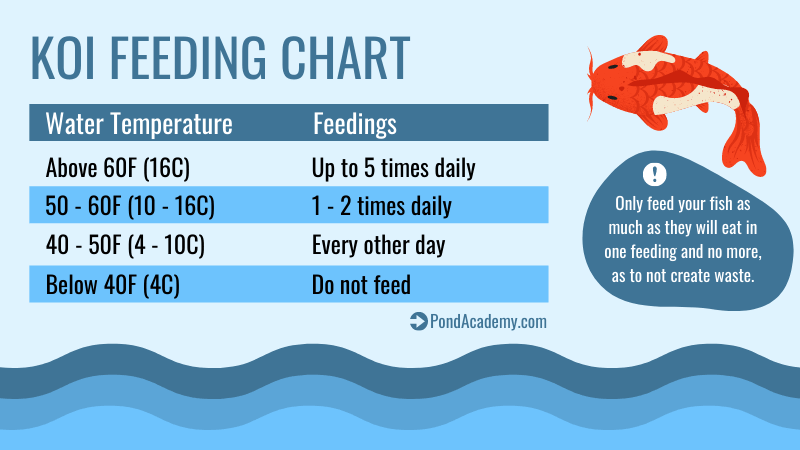Feeding Pond Fish in the Winter: Here's How to Do it
Pond Academy is reader-supported. Buying through links on our site may earn us an affiliate commission. As an Amazon Associate I earn from qualifying purchases.
Pond fish are fed throughout the warmer months to keep them healthy and active, but do they need food during wintertime?
As the temperature of your pond drops, it is extremely important to adjust their feeding schedule to avoid causing water quality issues and, worse, potentially killing your fish!
So, let's look at whether you need to feed pond fish in the winter and how to properly adjust their feeding schedule for the healthiest fish possible.
Should Pond Fish Be Fed in Winter?
Whether pond fish (koi carp, goldfish, etc.) should be fed or not during Winter has more to do with water temperature than the season.
![]() IMPORTANT
IMPORTANT
I should clarify that I am talking about cold water pond fish you plan to leave outdoors during Winter. Tropical Fish you bring indoors over winter will have a different feeding schedule.
In fact, throughout the year (not just Winter), your pond fish feeding schedule should be entirely based on the temperature of the water, assuming you plan to feed them at all.
Their feeding schedule can be fairly nuanced, so we made it as simple as possible to understand with our feeding chart below.
And, if you haven't already, you will want to invest in a quality pond thermometer so you can regularly check the water temperature of your pond.
Lastly, make sure you've properly winterized your pond to help ensure the survival of your pond fish over the cold weather months.
When to Stop Feeding Pond Fish in Winter
As mentioned, there's not a specific month you stop feeding pond fish, but rather a certain water temperature.
In other words, if you live in a warmer temperature zone where the water temperature of your pond does not fall below 40 degrees F (4 degrees C), you can safely feed your pond fish. However, if the water temperature does dip below 40° F (4° C) regularly or for an extended period of time, then you will want to stop feeding them.
Why? Your fish typically won't eat food when water temperatures drop below 40° F (4° C) as they will start to slow down for the Winter, a process known as torpor (see Do Pond Fish Hibernate in Winter? for more information). Because of this, the uneaten food will just sink to the bottom of your pond and create water quality issues. If they do eat when the water temperature is this low, the food may not be properly digested, allowing it to decay in their system, causing health issues and potential death.
So, it's important to keep your pond fish on a feeding schedule according to the pond water's temperature, not the season. This chart will help you visualize when and how much you feed your fish.

Keep in mind, if you live in an extremely cold-weather zone, but you heat your pond in winter, you'll want to keep an eye on the water temperature to know if and when to feed your fish.
When to Start Feeding Pond Fish After Winter
You can safely start feeding fish again after Winter in Spring when the water temperature is regularly above 40° F (4° C). Do not be tempted to feed the fish during unseasonal warmup periods, as it can quickly cool back down and lead to digestive issues for your fish.
Just remember, it has more to do with water temperature than the season, so refer to the feeding chart above and regularly check your pond water temperature throughout the year to ensure the healthiest, happiest pond fish.
Check out our post on when to start feeding pond fish after winter for more information.
How Long Can Pond Fish Go Without Food?
This varies wildly depending on the type of fish, their size, the temperature of the water, and so on. Plus, whether you mean without feeding them or without any food at all. In your typical backyard pond or water garden that isn't overstocked, your fish might not even need to be fed if there's plenty of algae, pond plants, and insects.
In colder weather, when the pond water temperature drops to 40° F (4° C) or below, their metabolism slows so they can survive months without any food at all.
Many pond owners ask this question because they wonder if they go on vacation for a week or two if their pond fish will survive. The answer to that is, your fish will most likely be fine if you go on a two-week vacation without being fed. If there's still a concern, you can always set up an automatic pond fish feeder to dispense food on a set schedule.
What to Feed Pond Fish
If you plan to feed your pond fish, make sure it's a high-quality food that they can easily digest, preferably floats on the surface of the pond (so it doesn't sink right away, adding to the sludge layer on the pond's floor), and contains all the essential animal and vegetable proteins.
I recommend Kaytee Koi's Choice Premium Fish Food since it meets that criteria plus contains all the important vitamins and nutrients needed for health and longevity.
You can feed fish bread and other treats, but for the healthiest fish possible, make the bulk of their diet a high-quality food like Kaytee Premium Fish Food.







